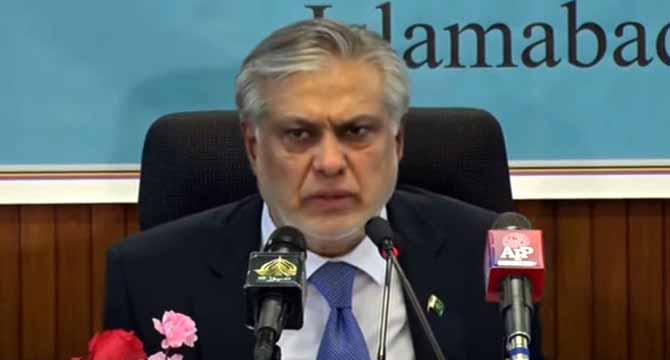ISLAMABAD , June 8, 2023: Finance Minister Ishaq Dar on Thursday launched the Pakistan Economic Survey of 2022-23.
Addressing the ceremony, the minister said the government based economy on five Es including exports, equity, empowerment, environment, and energy. “There are 17 chapters in the survey,” he added.
He went on to say that Pakistan’s economy took a downward slope from world’s 24th largest economy in 2018 to 47th position in 2022. “It speaks all about economy,” he added.
The GDP growth stood at 0.29pc, adding that growth for agriculture, industry, and service sector stood at 1.5pc, 2.59pc, and 0.86pc respectively. “The GDP growth is a realistic assessment and nothing could be better than this,” he added.
The government, he said, expected the GDP growth of 3.5pc for the next fiscal year. “PSDP expectation is no less than Rs1600billion for provinces,” he added. The federal PSDP would cross the mark of Rs1.15trillion, he said.
IT export target had been set at $15billion for the next five years with $4.5billion for the next year, he said. “We have set a target to shift energy to 20pc green energy by 2025 and 30pc by 2030,” he added. It would save us, he said, primary energy by 15-20pc.
As for the CPI, he said it remained at 16pc for urban sector, and rural inflation around 20pc with an average of 18pc.
The FBR tax collection was, he said, at $6210billion till end of May, increase from $5348billion in the preceding year. “They had a target of $7000billion,” he added. It was commendable, he said.
Mr Dar said the PML-N government left the stock market at 50,000 in 2018. Highlighting Pakistan’s position as the PDM-led government took oath in 2022, he said there had been talks of Pakistan defaulting, adding that the government had to uplift it. “Pakistan’s fiscal deficit rose from 5.8pc in 2018 to 7.9pc in 2022,” he added. Investment on anti-terrorism operations made it reach 5.8pc, he said, otherwise it would have been on 4.8pc.
As for as the trade deficit, he said, it rose from $30.9billion in 2018 to $39.1billion in 2022. “The current account deficit increased to 4.7pc of the GDP,” he added. Foreign direct investment shrunk from $2.8billion to $1.9billion, he added.
He went on to say that the PML-N government left circular debt at $1148billion and inherited $2467billion in 2022. “Public debt percentage of GDP increased from 63.7pc in 2018 to 73.9pc in 2022,” he added.
The finance minister said debt servicing increased from $1800billion in 2018 to over $7000billion today. “Pakistan’s credibility and trust was also shaken in the world,” he added.
He said the global GDP had decreased and inflation had increased in recent years, adding that the global trade saw a five time decline. “The world is a global village and these have repercussions,” he added.
The “unprecedented floods” caused a damage of $30billion to Pakistan, he said.
Mr Dar went on to say that Pakistan completed only one IMF program and that too in from 2013-16, adding that government paid political cost for the recent negotiations with the lender. “We are ready for the IMF’s ninth review,” he added.
He said the revival of the program was necessary to restore Pakistan’s credibility, adding that the government had to take difficult decisions. “We had two choices; carrying a deficit of $6400billion or fulfilling sovereign commitments,” he added. We took, he said, the latter path.
After that, food and pharmaceuticals, and export-related spare parts were the government’s priority, he said. “We are engrossed in a vicious cycle of devaluation,” he added. He did not understand, he said, what world the economic pundits lived in.
The FM said lack of trust in Pakistan had brought exchange rates from estimated Rs244 to the current rate of around Rs300. “It will be revived automatically,” he added.
He said tight fiscal discipline would continue, adding that everyone should play their role in uplifting the economy. “Despite all the constraints, the PDM-led government did this,” he added.
Ahsan Iqbal calls it a year of force majeure
Planning and development minister Ahsan Iqbal said the outgoing fiscal year was an year of force majeure, adding that Pakistan’s economy had to face three accidents. “First accident is $50billion trade deficit; second pertained to no release of development budget in last quarter; and third was concerned with unprecedented loss of $30billion by floods,” he added.
He went on to say that targets and numbers had no correlation, adding that this must be taken into account. “The government increased higher education budget from Rs26billion to historical high of Rs60billion,” he added.
He said Rs80billion had been spent on projects related to future of Pakistan under the PM’s initiative program.

